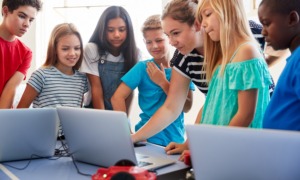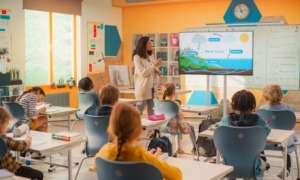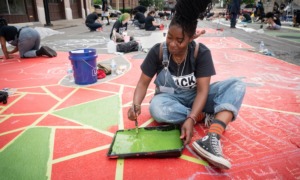
Art_Photo/Shutterstock
.
In the past few months, rapid shifts to online and remote learning have taken place across schools and out-of-school programs in response to COVID-19, impacting over 50 million children and youth in the U.S. alone. Educators have made commendable efforts to develop new practices and connect deeply with students and families — grappling together with the collective trauma of this moment and its disproportionate impacts on vulnerable groups.
Like many other pivotal moments in history, this crisis has magnified the ongoing legacies of institutional racism, colonialism and capitalism in our society. For many social justice educators and community-based youth workers, this has been a time to deepen critical consciousness around these forces of oppression, to build power with young people and to refuse notions of “business as usual.”
Adults hold responsibility to approach the work of healing and transformation with urgency, and to act in solidarity with our young people who have long been harmed by the status quo. We believe that intergenerational collaboration is essential to reimagining our places of education and our spaces for community healing and well-being. With societal fault lines laid bare, and our motivation heightened by tragedy, this is a moment of radical possibility for the fields of education and youth development.
For us, radically reimagining education and youth programming begins with building authentic partnerships between youth and adults, which is the key practice we explore in our edited volume “At Our Best: Building Youth-Adult Partnerships in Out-of-School Time Settings.” This kind of collaborative work — found in historical movements as well as in contemporary times — demands reciprocity in teaching, learning and decision-making across age groups.
How these partnerships work
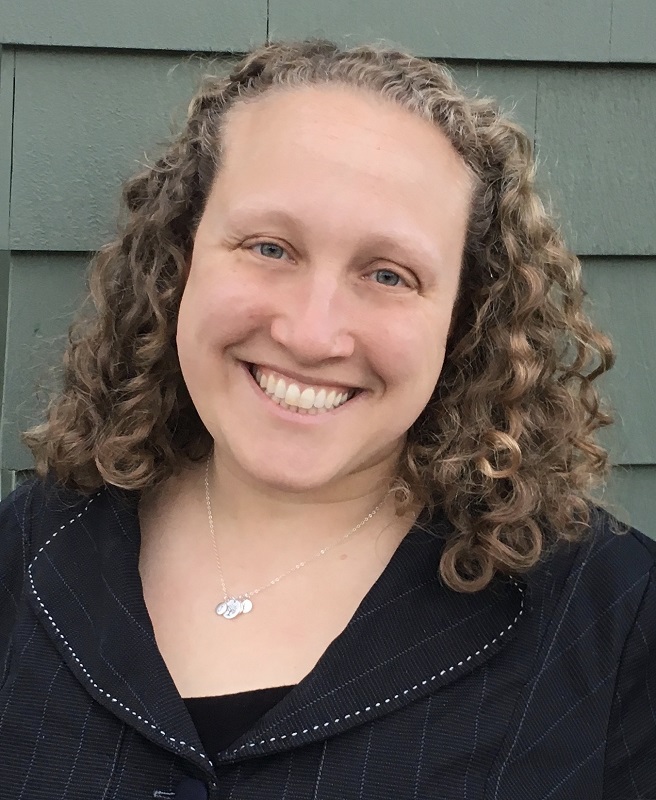
Gretchen Brion-Meisels
It requires mutual respect and deep listening that dismantle traditional age hierarchies and confront negative views of young people. While these partnerships can occur in a variety of settings, we specifically celebrate these intergenerational efforts in out-of-school time programs and community-based program spaces.
Over the last two years, we’ve had the honor of learning from over 50 educators, youth workers, researchers and young folks about how they engage in meaningful youth-adult partnerships to transform and heal their communities. The contributions of these individuals expand and deepen foundational research on youth-adult partnerships conducted by Shepherd Zeldin, Brian Christens and Jane Powers, who define youth-adult partnership as the practice of, “(a) multiple youth and multiple adults deliberating and acting together; (b) in a collective fashion; (c) over a sustained period of time; (d) through shared work; (e) intended to promote social justice, strengthen an organization and/or affirmatively address a community issue.”
The authors in our edited volume build upon this notion of youth-adult partnership and illuminate the importance of trusting relationships, the radical possibility inherent in problem-posing methodologies, the imperative of democratic participation and the need for collective action. We share these four lessons with you here with the hope that they will motivate intergenerational dialogues within your own contexts and communities.
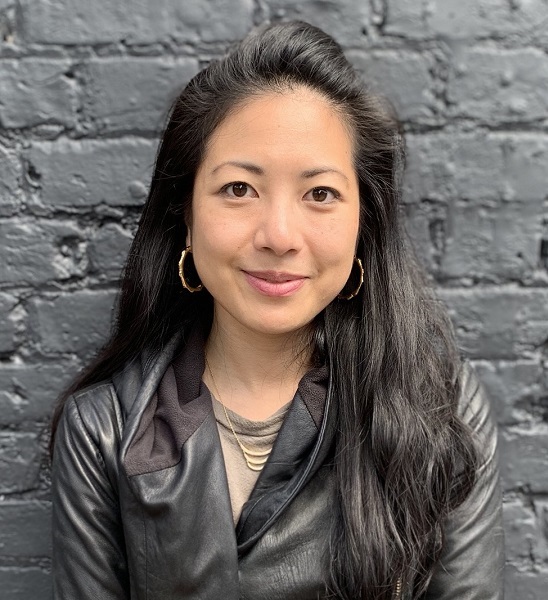
Jessica Fei
Trust between youth and adults is essential for any kind of collaborative endeavor and requires ongoing relationship-building efforts on the part of adults. Research on trust development in out-of-school-time settings highlights a set of contextual and relational factors that support the development of trusting youth-adult relationships, such as: the hiring and training of adults who foster feelings of respectful, reciprocal, developmentally appropriate relationships and organizational structures that support consistent, responsive programming. Across the chapters of our book, authors also discussed developing organizational transparency, centering consistency in relationship building over time, and commitments to honor the humanity of each individual and collective well-being as central facets of trust-building. Whether remote or in-person, synchronous or asynchronous, trusting relationships are essential for collaboration and growth.
Once trusting relationships are built, it becomes possible for teaching and learning to draw on problem-posing methodologies to engage in activities of interest and importance to young people. Problem-posing methodologies are a philosophy and set of practices that hold both adults and youth as capable of critical questions and insights; rather than imagining knowledge as moving from teacher to student, these approaches to education center the importance of dialectical learning. In addition, problem-posing methodologies seek to constantly unveil “the socio-political realities which exist for students,” push “for the acknowledgement of limiting factors”and co-produce “a resistance to those limitations.”
Democratic processes crucial
Across the 14 unique contexts written about in our book, learning centered in praxis (cycles of action and reflection) were consistent. The authors of these chapters described relationships and programs that were always in motion — always asking, critiquing, acting and reflecting on themselves and the world around them, and often taking up deep questions of structural inequity along the way. Our current context is full of authentic knotty questions with which youth and adults can engage, together.
A third element of authentic youth-adult partnerships is a commitment to prioritizing democratic participation, across all levels and activities of an organization or entity. Democratic participation is typically defined as a set of processes through which citizens or constituents influence decisions that impact their lives, either directly or through representation. Although socio-political constraints often make democratic participation challenging, the authors with whom we spoke frequently noted its importance in their out-of-school time programs. Their chapters describe strategies for co-constructing purpose, process and meaning, equalizing voice, collective visioning, transparency and leadership distributed among youth and adults. Unfortunately, democratic participation is too often overlooked in this strange and isolating moment. Citing urgency, a lack of resources,or limited time, too often adults push forward with decision-making that is not inclusive of youth voices and perspectives.
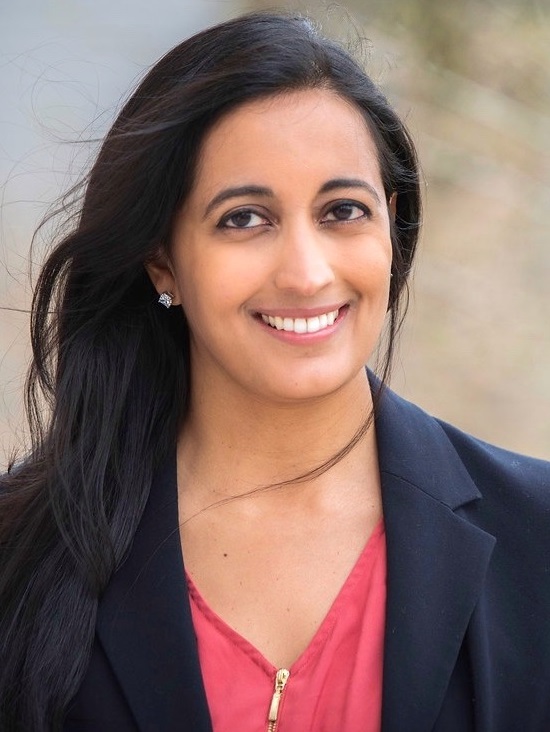
Deepa Vasudevan
Finally, and of note, the last two years have taught us volumes about the importance of uplifting the collective. Whether involved in creating art, planning conferences, engaging in advocacy and activism, or conducting academic research, our authors describe the importance of focusing on collective action and outcomes. In youth-adult partnerships, trusting relationships can be catalyzed through collective action toward shared goals.
Although trusting relationships are key to their practice of youth-adult partnership, they are not enough; the youth and adults with whom we spoke were in relationship around a set of collective goals and a commitment to collective action. Often, it is these moments of collective action that strengthen trust between adults and youth, and that build a sense of hope. The commitment to the collective is an antidote to the individualism that is dominant in many U.S. institutions, allowing us to ground ourselves in principles of community, solidarity and care.
Together, trusting relationships, problem-posing methodologies, democratic participation and collective action lay a foundation upon which the four core elements of youth-adult partnerships, as articulated by Zeldin and colleagues, can rest. The power of this type of partnership is palpable, particularly in moments of radical reimagination. Across the chapters of our book, authors describe youth-adult partnerships that are generative: It results in musical and artistic expression, the identification of — and subsequent response — to community needs, programmatic and local policy changes, deeper understandings of self and other, positive growth in individual youth’s academic and social trajectories, bridging of experiences and cultures, re-evaluations and dismantling of power hierarchies, and new forms of knowledge.
What type of educational spaces and places would we choose to build, if we began with intergenerational dialogue in schools and other educational settings? Who would we invite to dream and plan with us? Intergenerational collaboration is not easy work, as our authors remind us through examples from their youth programs and intergenerational collectives; conflicts naturally emerge in this process and adult visions or opinions can get upended. Partnerships in practice are rife with everyday tensions of power.
As three educators and researchers, we acknowledge that beginning with these kinds of partnerships is difficult. But we are confident that the best work emerges through solidarity — when adults are listening to young people, and when we are collaborating toward new possibilities in the spaces we share.
Gretchen Brion-Meisels is a lecturer at the Harvard Graduate School of Education whose work draws on critical participatory action research approaches to understand how schools and communities can become more equitable and loving spaces.
Jessica Fei is the director of programs for the Sadie Nash Leadership Project. As an educational researcher and practitioner, she seeks to center the voices and leadership of youth, and to build relationships and communities grounded in authentic care.
Deepa Vasudevan is a visiting lecturer in education at Wellesley College whose research focuses on the occupational identities and expertise of community-based youth workers, constructions of care work in education and youth engagement in out-of-school learning experiences.


